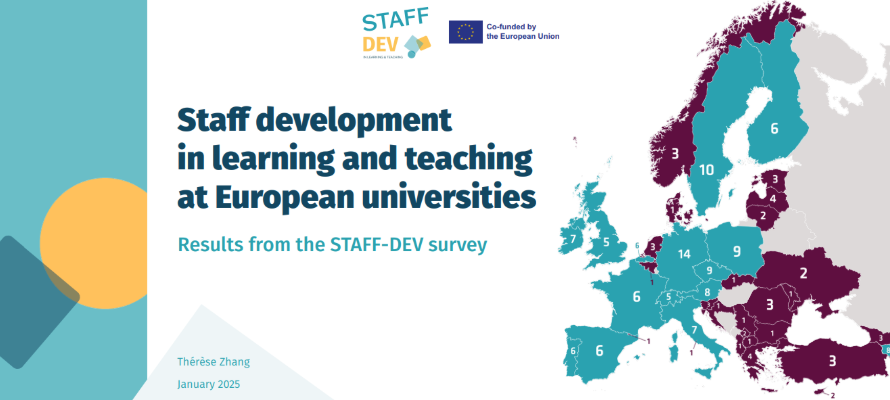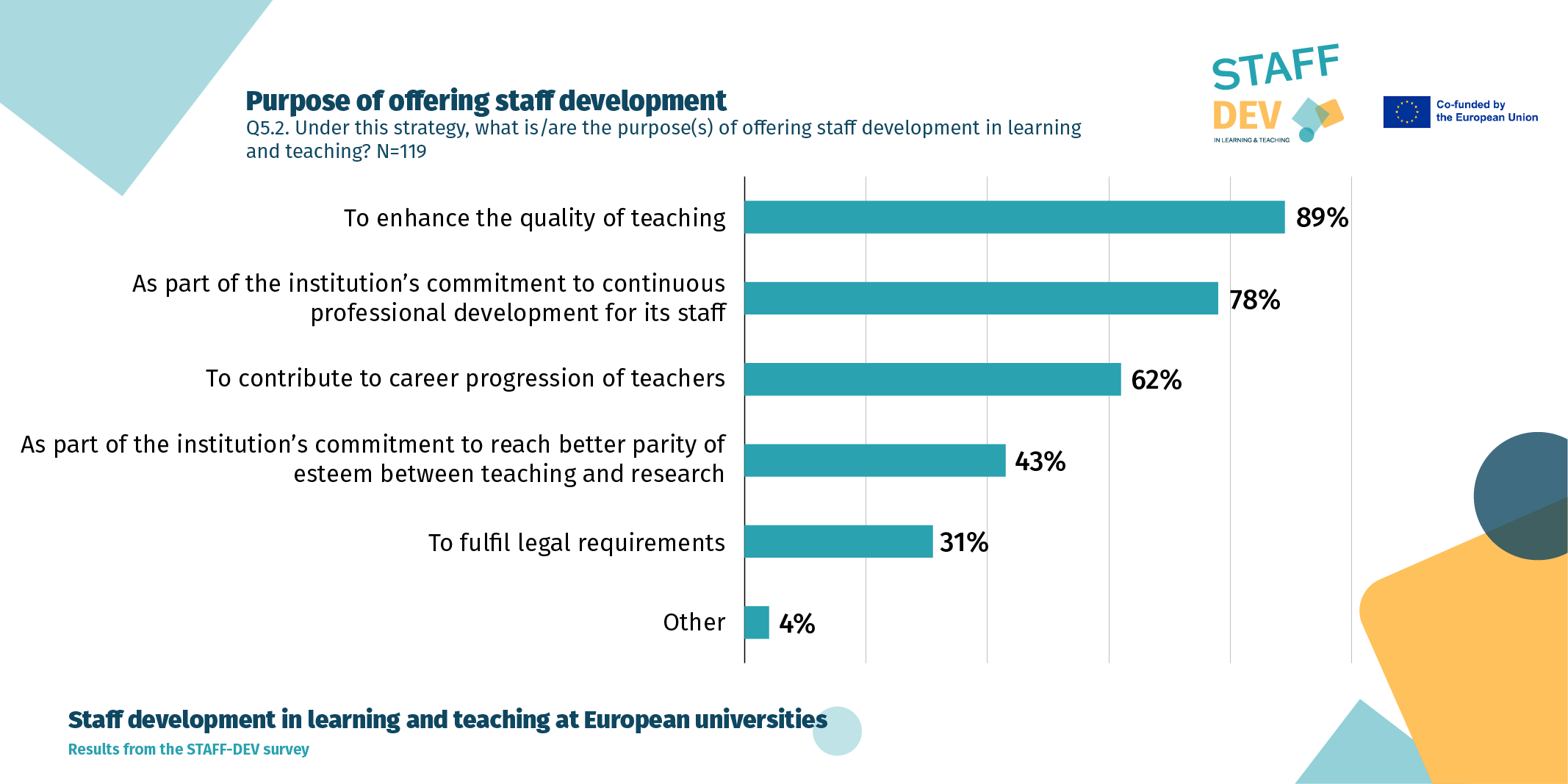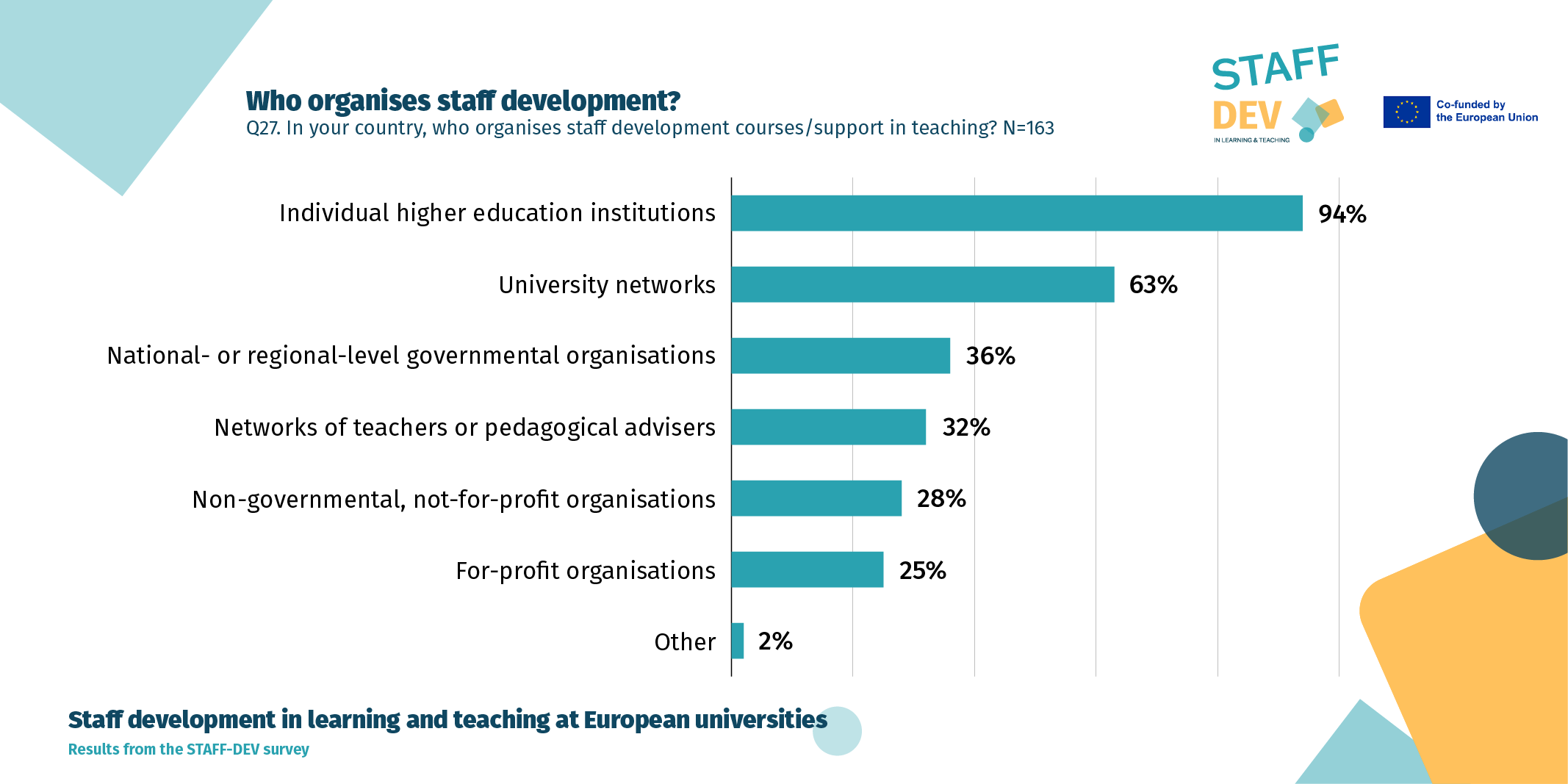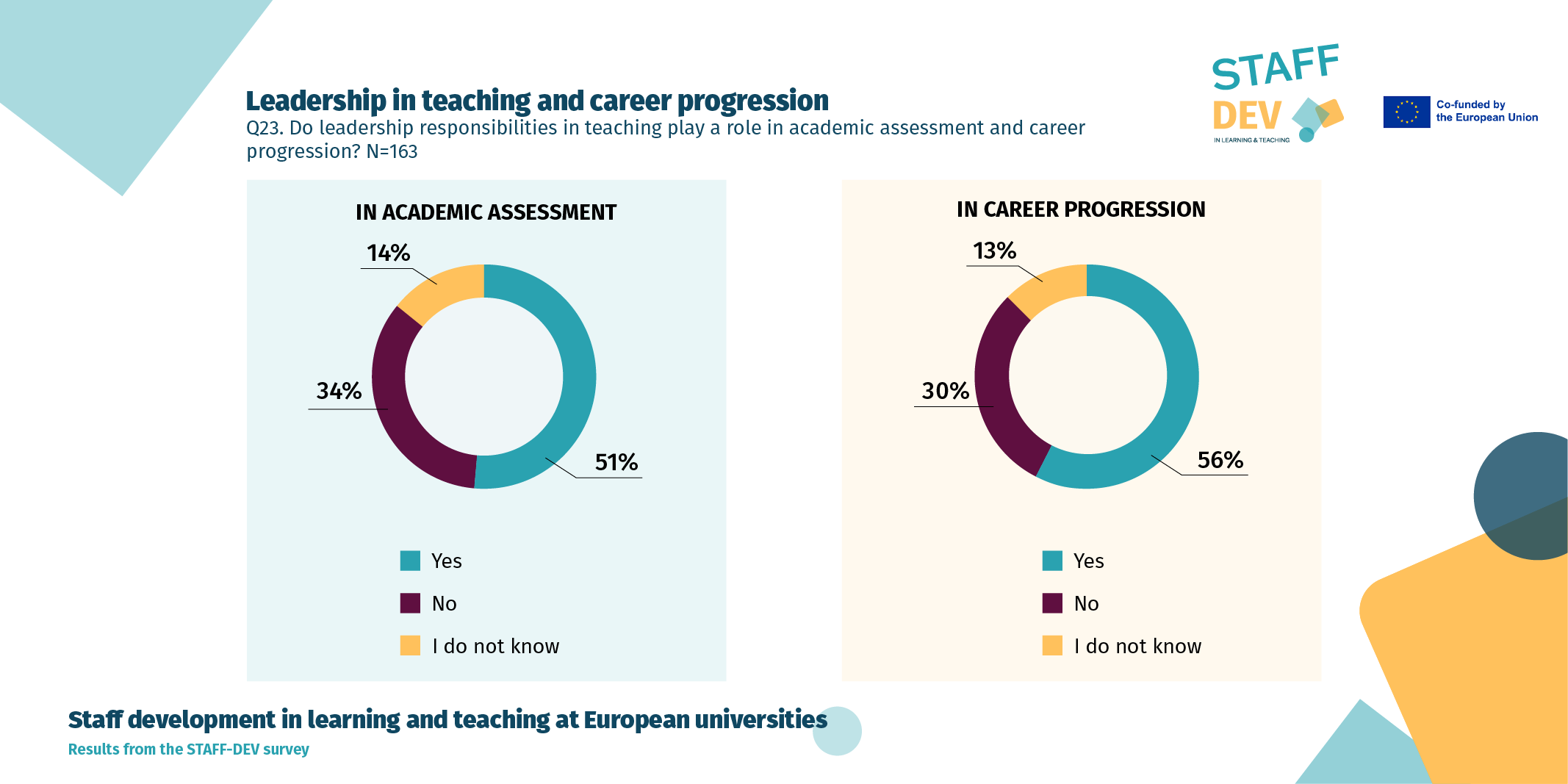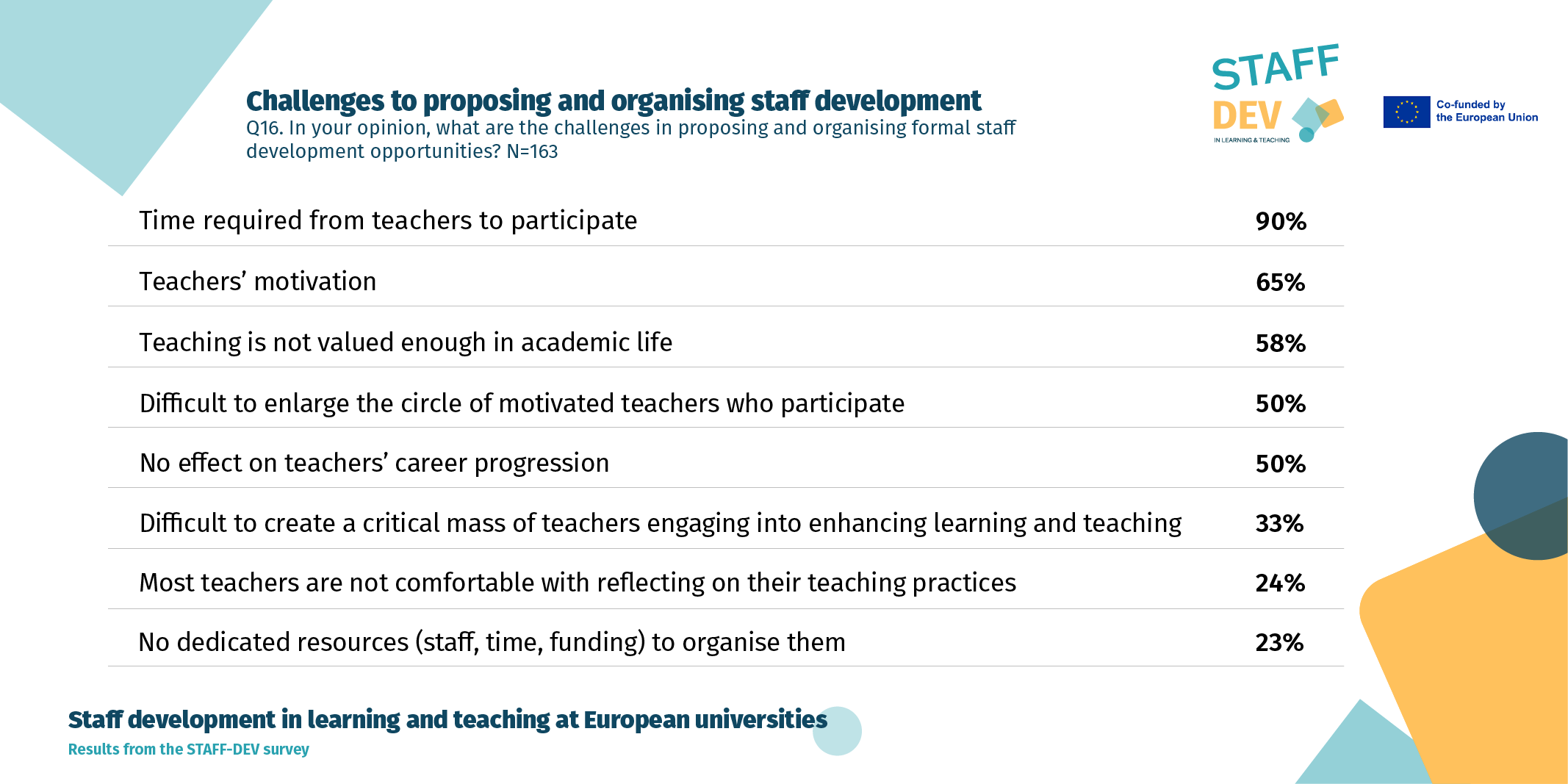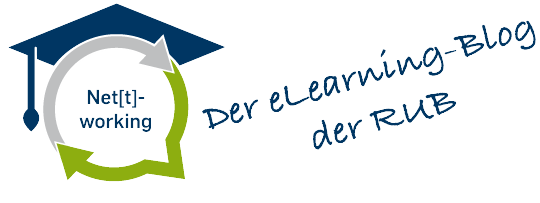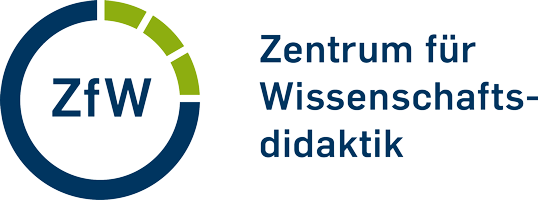Who organizes staff development in teaching and learning at European Universities? Why do institutions offer staff development? Does a didactical qualification play a role in academic assessments and career progression? And what are the challenges to proposing and organizing staff development? Insights can be found in the new STAFF-DEV Survey Report.
Selected key findings from the survey
The development of teaching and learning competencies is crucial for the success of higher education institutions across Europe. The latest STAFF-DEV Survey Report delves into this topic. With over 160 responses from higher education institutions in 40 European countries, the report provides valuable insights into national and institutional strategies for staff development.
The STAFF-DEV survey was conducted between April and July 2024. Participating institutions were invited to provide comprehensive information on:
• the institution’s profile
• staff development approach and activities organised at the institution
• how the institution organises career progression and celebrates teaching
• the national context.
The survey collected a total of 163 responses from Higher Education Institutions (HEIs) in 41 systems across the European Higher Education Area. Only one response per institution was collected, for which a senior institutional representative was asked to take responsibility. About half of respondents were senior administrative staff at institutional level (49% of HEIs), another quarter were vice-rectors or in an equivalent function (24%), and the remaining quarter were rectors or a member of the rector’s cabinet (11%) and other senior positions with responsibilities in staff development.
The country with the highest number of responses was Germany (14 responses), followed by Sweden (10), Czechia (9), Poland (9), Armenia (8) and Austria (8).
Structure of teaching related staff development
An impressive 89% of the participating European universities highlight the significance of staff development in their teaching and learning strategies. The primary aim is to enhance the quality of teaching, ensuring students are well-prepared for their future careers. Notably, 86% of the universities have established dedicated teaching and learning centers to support these efforts.
One major finding from the report is that formal development programs are often optional. However, for newly hired academic staff, participation in these programs becomes frequently mandatory. 94 % of the respondents indicate that staff development is organized by higher education institutions themselves, followed by University networks.
At Ruhr University, the ZfW as center for teaching and learning is responsible for the didactic training and further education of teachers. Our didactic qualification program offers a variety of workshops and seminars on teaching and learning throughout the year. Through our
project UNIC, there are also offers in English.
Staff Development and Career Progression
Almost half of the surveyed universities integrate staff development into career progression planning. Documented professional growth plays a pivotal role in key processes such as:
Promotions to permanent positions.
This linkage between staff development and career pathways reflects the strategic importance universities are placing on equipping their academic staff with the tools for success.
The Role of National Initiatives
National initiatives are crucial in driving staff development. According to the survey, 61% of universities found national programs introduced in the past five years to be highly beneficial. While ministries often provide funding and set the framework, universities take the lead in implementing these initiatives. These programs not only strengthen institutional practices but also encourage the exchange of best practices across the sector.
Although staff development is considered as an important factor for successful academic careers and to enhance the quality of teaching there are challenges to proposing and organizing staff development. The top three named reasons for teachers not participating in formal staff development opportunities are the required time, lack of motivation and the lack of value of teaching in academic life.
The STAFF-DEV Survey Report is one milestone for the project. The findings aim to support universities in refining their staff development strategies further. The ultimate goal is to build a robust knowledge base and foster sustainable capacity building in teaching and learning across Europe.
Download the full report from the EUA website.
In the coming weeks, a second report will be published from the project, in which the results of focus group discussions on the same topic area will be presented. Stay informed about future developments of the project.
More about the STAFF-DEV project
The EU-funded ‘Staff development for learning and teaching at European universities’ (STAFF-DEV) project aims to map and analyse how staff development is implemented at European HEIs, how it is embedded into institutional and national strategies for learning and teaching and academic assessment, and what HEIs and national- and system-level stakeholders could learn from each other in this regard. The project will contribute to a knowledge base on staff development, as well as capacity building in learning and teaching, benefitting HEIs at different stages of developing their support and strategic approaches on learning and teaching and academic assessment.
